Socialization is a crucial process for preparing your pet to comfortably interact with other animals. Whether you have a dog or a cat, socialization should ideally start during the sensitive period of their early life. By exposing them to different animals, people, and environments, you can help them develop the necessary skills to thrive in various social situations.
Creating a safe and positive socialization plan for your pet is essential. Starting with pre- and post-adoption socialization plans can provide guidance for adopters. These plans can be customized to suit your pet’s needs and ensure they have regular positive experiences with other animals.
Well-managed socialization classes can also play a significant role in socializing your pet. These classes allow for controlled interactions with other animals, supervised by professionals who can guide you throughout the process. Positive reinforcement and rewards for calm and playful responses to social interactions further reinforce the desired behavior.
For pets with special behavioral needs, consulting with a veterinarian or animal behavior expert can provide additional guidance. They can help address any specific challenges and tailor a socialization plan that suits your pet’s individual requirements.
Key Takeaways:
- Start socializing your pet during the sensitive period of their early life.
- Create a personalized socialization plan for your pet, including pre- and post-adoption socialization.
- Well-managed socialization classes and positive reinforcement are key components of safe socialization.
- Consult with a veterinarian or behavior expert for pets with special behavioral needs.
- Regular socialization helps your pet become happier, well-adjusted, and adaptable to new situations.
The Importance of Early Socialization for Puppies and Kittens
Early socialization is crucial for puppies and kittens as it plays a vital role in shaping their behavior and temperament. By exposing them to various social experiences early on, we can help them develop into confident and well-adjusted pets.
During the sensitive period of 3-14 weeks for puppies and 3-9 weeks for kittens, their brains are highly receptive to new experiences. This is the ideal time to introduce them to different animals, individuals, environments, activities, and objects. By doing so, we can help them grow comfortable and calm in various situations.
Creating a well-planned socialization plan tailored to their developmental needs is crucial. It involves carefully managing their exposures to ensure they have positive and diverse experiences. This can include controlled introductions to other animals, supervised interactions with individuals of different ages, exposure to various environments, and positive reinforcement through rewards and praise.
Additionally, enrolling puppies and kittens in socialization classes specifically designed for their age can provide numerous benefits. These classes expose them to controlled social interactions, helping them develop essential social skills and learn appropriate behavior.
It’s important to note that while early socialization is crucial, it’s equally vital to ensure the safety of young pets. Unvaccinated puppies or kittens should not be exposed to unvaccinated animals or potentially contaminated places to prevent the risk of diseases. Careful consideration should be given to their health and vaccination status when planning socialization activities.
| Benefits of Early Socialization for Puppies and Kittens: |
|---|
| 1. Development of a calm and confident temperament. |
| 2. Preparation for life in their new households. |
| 3. Enhanced adaptability to new people, places, and animals. |
| 4. Improved communication skills and behavior in different settings. |
| 5. Decreased likelihood of exhibiting destructive behavior, aggression, or fearfulness. |
Socializing Adult Dogs: It’s Never Too Late
Contrary to popular belief, it is possible to socialize adult dogs. While it may be more challenging than socializing puppies, it can still be achieved. Socializing an adult dog involves introducing them to new experiences and potential triggers while rewarding calm behavior with treats and praise. Starting slow and ensuring a controlled environment is crucial.
One effective way to socialize adult dogs is by going for walks. This provides them with the opportunity to encounter new sights, sounds, and smells, helping them become more comfortable in different environments. Additionally, introducing adult dogs to other dogs and adult humans can aid in building social skills and fostering positive interactions.
Supervised interactions with puppies and children can also be beneficial for socializing adult dogs. Puppies can teach adult dogs important social cues and help them develop patience, while interactions with children can help adult dogs become more comfortable around little ones.
For owners looking to provide more extensive socialization opportunities, dog parks and doggy daycare can be excellent options. These environments allow adult dogs to interact with a variety of other dogs in a controlled and supervised setting, promoting healthy socialization.
“Socializing an adult dog involves introducing them to new experiences and potential triggers while rewarding calm behavior with treats and praise.”
Remember, while socializing adult dogs is possible, it’s important to be patient and understanding. Each dog is unique, and their socialization journey may progress at a different pace. By providing positive experiences and rewards for their calm behavior, you can help your adult dog become more socialized and comfortable in various situations.
| Benefits of Socializing Adult Dogs |
|---|
| Improved behavior and decreased aggression |
| Enhanced comfort in social settings |
| Reduced fear and anxiety |
| Increased adaptability to new experiences |
| Enhanced communication skills |
Guidelines for Socializing Adult Dogs
When it comes to socializing adult dogs, it’s important to follow some guidelines to ensure a positive and successful experience. By taking the time to introduce them to new people, places, and animals in a controlled and calm manner, you can help your adult dog develop healthy social skills and improve their overall well-being.
- Start slow: Begin the socialization process gradually, allowing your dog to acclimate to new experiences at their own pace. Rushing the process can lead to stress and fear, which may hinder their social development.
- Create a calm environment: Before introducing your dog to new social situations, make sure they are in a relaxed state of mind. A calm dog is more likely to respond positively and learn from the experience.
- Positive reinforcement: Reward your dog for exhibiting good behavior during social interactions. Use treats, praise, and affection to reinforce their calm and friendly responses to new people, animals, and environments.
- Go for walks: Taking your dog for regular walks can expose them to various stimuli, such as different sights, sounds, and smells. It allows them to become accustomed to the world around them and builds their confidence in different social settings.
- Attend training classes or doggie daycare: Enrolling your adult dog in training classes or doggie daycare can provide structured socialization opportunities. These settings allow for supervised interactions with other dogs and humans, helping them develop positive social skills.
- Introduce to other adult dogs and humans: Arrange controlled playdates or friendly encounters with well-behaved adult dogs and humans. This helps your dog become comfortable and familiar with different personalities and social behaviors.
- Gradually expose to puppies and children: While adult dogs may not have had much exposure to puppies or children, it’s beneficial to introduce them slowly and under supervision. This gradual exposure helps them learn how to interact appropriately and adapt to different age groups.
Remember, socializing adult dogs is a process that requires patience and consistent effort. With time and positive reinforcement, your adult dog can become well-socialized, leading to a happier and more confident furry companion.
Tips for Socializing Cats: From Kittens to Adults
When it comes to socializing cats, both kittens and adult cats can benefit from positive experiences and interactions. Early socialization is critical for kittens between 4 and 16 weeks of age, but it’s never too late to start socializing adult cats. Here are some helpful tips to ensure a smooth socialization process:
- Getting kittens used to being handled: Start by gently handling kittens and gradually increase the duration and intensity of the handling sessions. This helps them become comfortable with human touch and reduces fear or stress.
- Speaking in a calm voice: Cats are sensitive to tone of voice, so speaking to them in a calm and soothing manner can help them feel at ease during social interactions.
- Scheduling gentle play sessions: Engaging in gentle play with kittens using interactive toys helps build their confidence and encourages positive associations with human interaction. It’s important to avoid rough play that may lead to fear or aggression.
- Introducing kittens to other pets: Using a baby gate to separate kittens from other pets initially allows them to see, smell, and interact in a controlled environment. This gradual introduction helps them build positive relationships with other animals.
- Teaching children to be gentle: If there are children in the household, it’s important to teach them how to interact with cats in a gentle and respectful manner. Supervised and positive interactions between children and cats can promote socialization and prevent any fear or aggression.
- Introducing cats to different people: Exposing cats to a variety of individuals, such as friends or family members, helps them become comfortable with different people and reduces their anxiety in social situations.
- Positive reinforcement and treats: Rewarding cats with treats and praise for calm and friendly behaviors during social interactions creates positive associations and motivates them to continue engaging in socialization.
By following these tips, you can help your cats, whether they are kittens or adults, become more socialized and comfortable in various social settings.
Benefits of Socializing Cats
Properly socializing your cats offers numerous benefits for both the cats and their owners. Socialized cats are more confident, adaptable, and less likely to display destructive behavior, aggression, or fearfulness. They also have better experiences when interacting with other animals, people, and environments, making it easier to expand their social circles and integrate into new households. Additionally, socialized cats tend to have better overall well-being and a harmonious relationship with their owners.
| Benefits of Socializing Cats |
|---|
| Increased confidence and adaptability |
| Reduced risk of destructive behavior, aggression, and fearfulness |
| Improved interactions with other animals, people, and environments |
| Easier integration into new households |
| Better overall well-being |
| A harmonious relationship with owners |
Benefits of Socializing Your Pet
Socializing your pet has numerous benefits. Proper socialization helps pets become happier, well-adjusted, and adaptable to new people, places, and other animals. It enhances their communication skills and behavior in different settings, increasing their confidence and comfort.
Socialized pets are less likely to display destructive behavior, aggression, or fearfulness. They are more likely to approach unfamiliar situations with curiosity and ease, which can lead to more positive experiences and interactions.
When pets are well-socialized, they are more comfortable in various environments, whether it’s going for a walk in the park, visiting the vet, or traveling with their owners. Socialized pets are less likely to experience anxiety or stress in unfamiliar situations, making these experiences more enjoyable for both the pet and the owner.
In addition to the benefits for the pet, socializing your pet can also have a positive impact on the owner’s peace of mind. Knowing that your pet is well-adjusted and confident in social situations can reduce worry and increase the overall enjoyment of having a pet.
Another advantage of socializing your pet is that it can make it easier to expand your family with other pets or children. A socialized pet is more likely to interact positively with new additions to the household and can help create a harmonious and enjoyable environment.
“Socializing your pet is an investment in their future well-being and happiness. By providing them with positive and varied social experiences, you are setting them up for a lifetime of positive interactions and adventures.”
In summary, socializing your pet offers numerous benefits, from increasing their happiness and adaptability to reducing destructive behavior and fearfulness. It enhances their communication skills, improves their experiences in different environments, and promotes a harmonious relationship with their owners and other pets. Socializing your pet is an investment in their well-being, ensuring they have the skills and confidence to navigate the world around them.
Conclusion
Socializing your pet is crucial for their overall well-being and can greatly enhance their quality of life. By following the appropriate guidelines and tips, pets can learn to socialize effectively and positively interact with other animals, people, and environments.
Whether they are puppies, kittens, or adult dogs and cats, it’s never too late to start the socialization process. Remember to be patient, provide positive experiences, and reward good behavior. Socializing your pet not only benefits them but also creates a harmonious and enjoyable relationship between pets and their owners.
FAQ
What is the best age to start socializing puppies and kittens?
The ideal time to start socializing puppies is between 3 and 14 weeks, while kittens should start socialization between 3 and 9 weeks.
What should adopters ask for when it comes to socialization plans?
Adopters should ask for pre- and post-adoption socialization plans to ensure that their new pets receive the necessary socialization experiences.
How can I socialize my pet with other animals and people?
Regular positive experiences, well-managed socialization classes, and ongoing rewards for calm and playful responses to social interactions are key aspects of socializing your pet with other animals and people.
Can adult dogs be socialized?
Yes, adult dogs can be socialized. While it may be more challenging than socializing puppies, it can still be achieved with patience and proper techniques.
What are some guidelines for socializing adult dogs?
When socializing adult dogs, it’s important to start slow, create a controlled environment, and reward calm behavior. Going for walks, introducing them to other dogs and humans, and gradually exposing them to puppies and children can help them build social skills.
Is it possible to socialize adult cats?
Yes, it’s never too late to start socializing adult cats. Getting them used to being handled, introducing them to new people and pets, and providing positive experiences can help with socialization.
What are the benefits of socializing your pet?
Proper socialization helps pets become happier, well-adjusted, adaptable, and confident. Socialized pets are less likely to display destructive behavior, aggression, or fearfulness, and have better experiences in various settings.

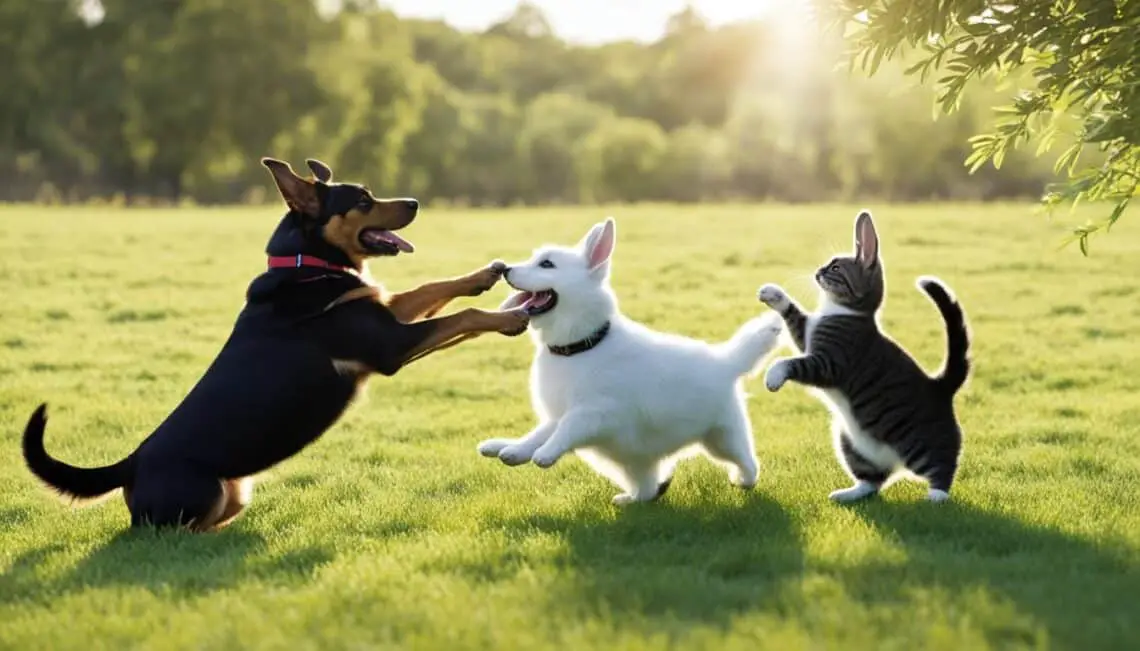
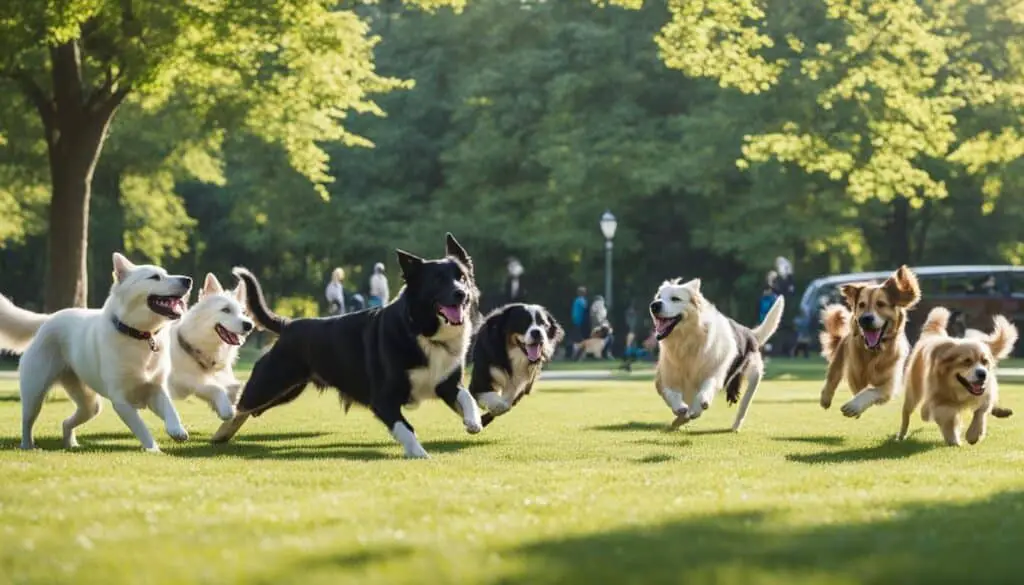
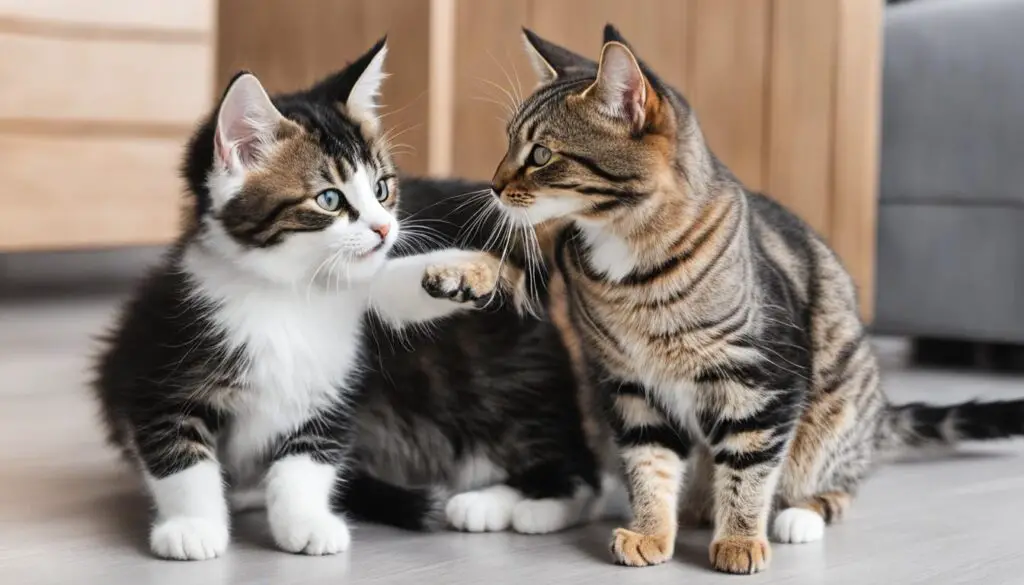
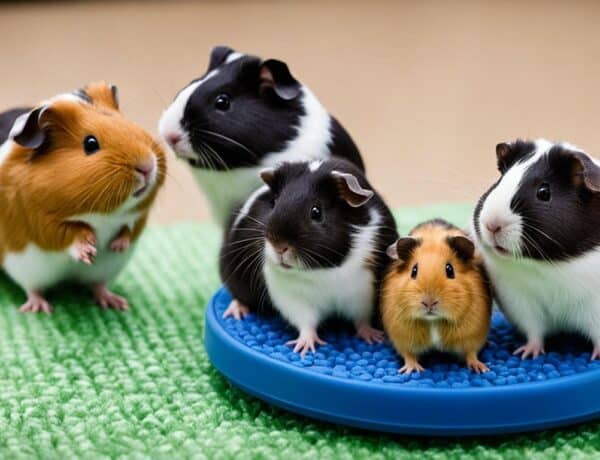

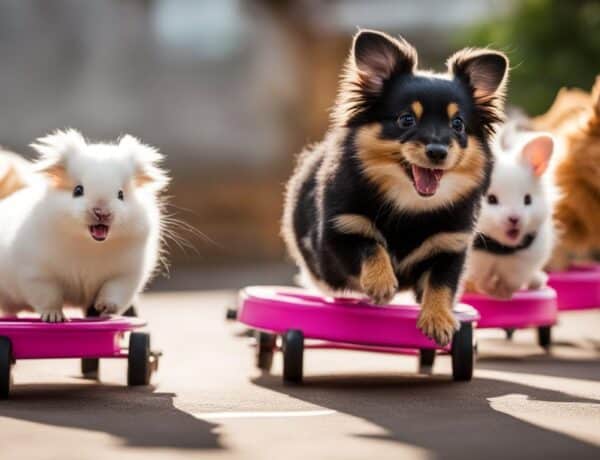
No Comments